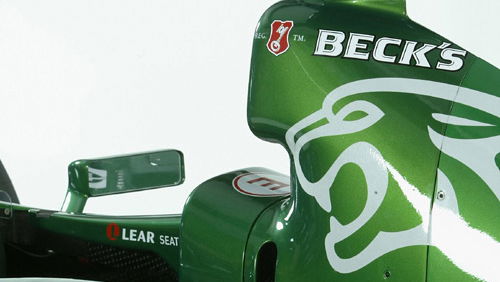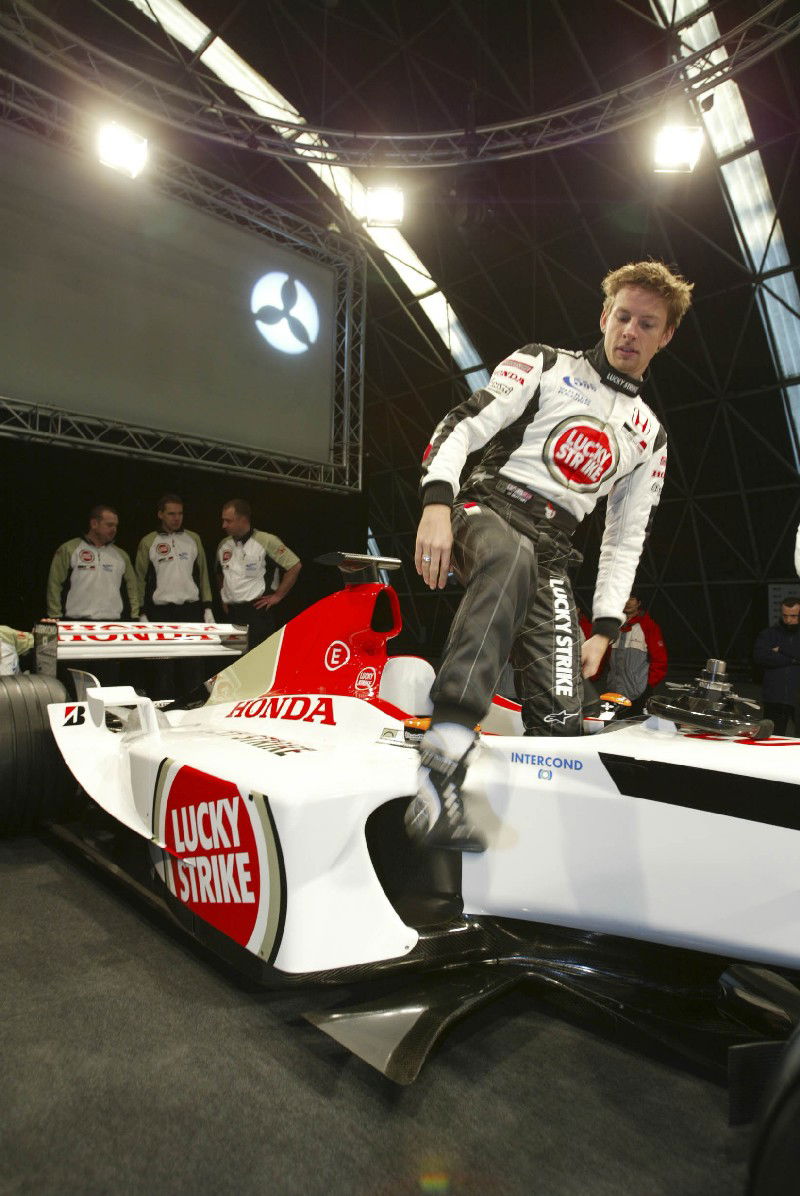Q&A: Jaguar's technical duo.
The Jaguar Racing F1 team will split the traditional technical director role into two halves this year, with Dr Ian Pocock [Engineering Director] and Malcolm Oastler [Chief Engineer] sharing the responsibilites.
Pocock will take on a managerial role, while Oastler will concentrate on the engineering side. Here they talk about their roles and their hopes for 2003 and beyond...

The Jaguar Racing F1 team will split the traditional technical director role into two halves this year, with Dr Ian Pocock [Engineering Director] and Malcolm Oastler [Chief Engineer] sharing the responsibilites.
Pocock will take on a managerial role, while Oastler will concentrate on the engineering side. Here they talk about their roles and their hopes for 2003 and beyond...
Q:
Malcolm [Oastler] if we can start with you first... ...You spent most of 2002 as a freelance consultant engineer to Jaguar Racing, working 20 hours per week, what made you decide to take on a senior full-time salaried position for 2003?
Malcolm Oastler:
The single most important factor that made me decide to take on this job was that the senior new arrivals at Jaguar Racing are of the right calibre when it comes to engineering best practice. And I guess the chief engineer role I've taken on is very much an engineering-based one. All the other stuff that has traditionally gone into a technical director's role - the management, the admin, the personnel issues, dealing with sponsors, dealing with media, everything that isn't strictly engineering, in fact - will be taken care of by Ian Pocock [engineering director, Jaguar Racing] and others. Ian is a highly capable engineer, but he's also fabulously competent at all the management-type stuff that I'm not. Now, don't get me wrong: proper management needs doing. It's vitally important. Crucial, in fact. And I'm into people, and I've always tried to make sure that everyone I've ever worked with was as well-managed as possible. But I guess I'm like most blokes in the sense that that side of things isn't the bit I enjoy most, to be honest. The bit I enjoy most is the engineering bit, plain and simple. That's what suits me best. That's what I'm good at.
Q:
What is it about Jaguar Racing's new management that makes them "of the right calibre"?
MO:
Because they are! From Richard Parry-Jones [head of Formula One, Ford Motor Company] down, they're all no-nonsense engineers, with no egos, no hidden agendas. Tony Purnell, David Pitchforth... all of them. They just want to get the job done with engineering best practice at the forefront of all development.
Q:
How much involvement have you had in the design of the R4?
MO:
Well, the days of one man designing a racing car from tip to toe are long gone - I last did that in 1987, in Formula Ford 2000! Ever since then, the process of car design has been increasingly a team process. And, besides, I was only a freelance consultant to Jaguar Racing in 2002, so I didn't have that much involvement in the conceptual side of R4 at all. But in terms of making it the soundly engineered racing car it needs to be, I've had a reasonably significant role, certainly, yes. And we're intending that R5, R6 and so on will be soundly engineered derivatives of R4.
Q:
Turning to you now, Dr Ian [Pocock] ...You began working in Formula One in the mid-1980s, but you've been out of it - working for Pi Research - for the past few years. What made you decide to come back in?
Dr Ian Pocock:
Well, I haven't been completely out of it - because of course I've been working for Pi Research, who do work not only for Jaguar Racing but for other Formula One customers, too. But, yes, I'd moved out of the direct cut-and-thrust of Formula One, certainly. But my time at Pi Research has been very instructive and educational for me. Before, I'd been very directly involved in the hands-on aspect of engineering, whereas at Pi Research I became far more involved in technical management, strategic thinking, planning, process and objective-setting.
Q:
Is that what you'll predominantly be doing at Jaguar Racing?
IP:
Yes, very much so. I guess I've sort of grown into this role. I think good engineers tend to fall into two categories: either they develop into ever more expert technical specialists or they migrate into technical management. I'm very much in the latter camp. So it'll be my job to oversee the implementation of good process and best practice with regard to all aspects of the technical operation. That should provide a very good synergy with Malcolm Oastler [chief engineer, Jaguar Racing], who will look after the hands-on side of things. Malcolm and I have known each other for a long time, incidentally. We first came into contact with each other on the Reynard Formula One project of the early 1990s - and then, through Pi Research, I knew him when he was at British American Racing. I've got a lot of respect for Malcolm. He's very thoughtful, very analytical, very much in favour of good engineering process.
Q:
Do you think the traditional technical director role in Formula One - combining the hands-on component with managerial responsibility - has now become too much for one man?
IP:
I think that's very true. In fact, if you look up and down the grid, I think you can see examples of that in various teams. The key thing is that people should recognise and understand where their true ability lies - because there will always be ways of developing and enhancing the career of an excellent engineer who might not be cut out for management.
Q:
Tony Purnell [Cheif Executive Officer, Premeir Performance Division], David Pitchforth [Managing Director, Jaguar Racing] and yourself have all come through Pi Research. Is that a case of 'jobs for the boys' or is there a good reason for it?
IP:
What you have to recognise is that Tony is a very capable entrepreneur. He built Pi Research up from a situation in which his desk was his kitchen table to a situation in which the company employs 330 people - and, more than that, he's been able to sell it to the Ford Motor Company along the way! One of his other attributes, however, is the ability to recognise and hire good people. Pi Research is full of highly talented people - always has been. Clearly, therefore, when Tony was given responsibility for Jaguar Racing, it was only natural that he should search his large network of contacts, both inside and outside Pi Research, in order to hire the people to help him make Jaguar Racing a success. And inevitably some of the people he ended up hiring were contacts from within Pi Research.
Q:
Jaguar Racing recently made 70-odd redundancies, a number of them on the technical and/or engineering side. Does Jaguar Racing have sufficient human technical/engineering resources for the tasks ahead of it?
IP:
No-one enjoys making people redundant, but you have to appreciate the economic environment that has made those redundancies unavoidable. Look at the global economy and look at what might be on the horizon in terms of worsening economic conditions. The company should actually be credited for taking proactive and corrective measures in an effort to be fully prepared for the future. The key thing, however, is that we at Jaguar Racing plan and target those human technical/engineering resources properly. That way, as our performance improves, we will be able to demonstrate to existing and potential sponsors that we can use resource in an appropriate manner. It all boils down to those same words - best practice.
Q:
How would you refute the suggestion that such a rigorous structure might stifle engineering flair?
IP:
Very easily! One of the key aspects of my role as engineering director will be to nurture that flair - but to nurture it in a directed way. Of course I'll welcome bright ideas - that goes without saying. But I'll also have to make sure that we research them in a focused manner. Unlike some of our bigger rivals, we don't yet have the resources to allow us to go down too many blind alleys. So it's a question of focusing our flair; what we can't afford is activity for activity's sake.
Q:
What are your personal goals for 2003?
IP:
I hope to eliminate, via the application of good engineering practice, some of the more obvious mistakes that Formula One teams can make. And, clearly, I also hope that we'll produce a good, reliable car. Now, I also hope it'll be a quick car - but, more than that, I hope that the performance potential delivered by our aerodynamicists, plus the Cosworth Racing and Michelin engineers, can be maximised in a reliable way. And I want that process to improve throughout the year, and throughout the team. And at the moment that process needs leadership, and it'll be my job to provide it.






